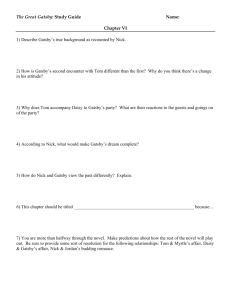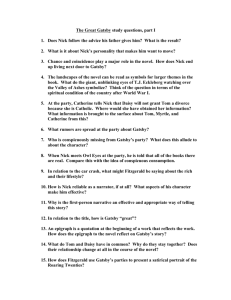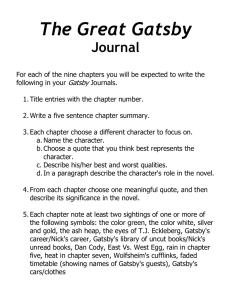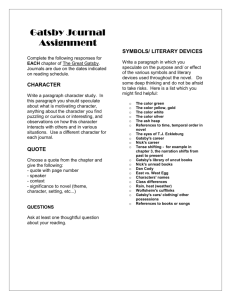The Great Gatsby: Final Exam Study Guide
advertisement
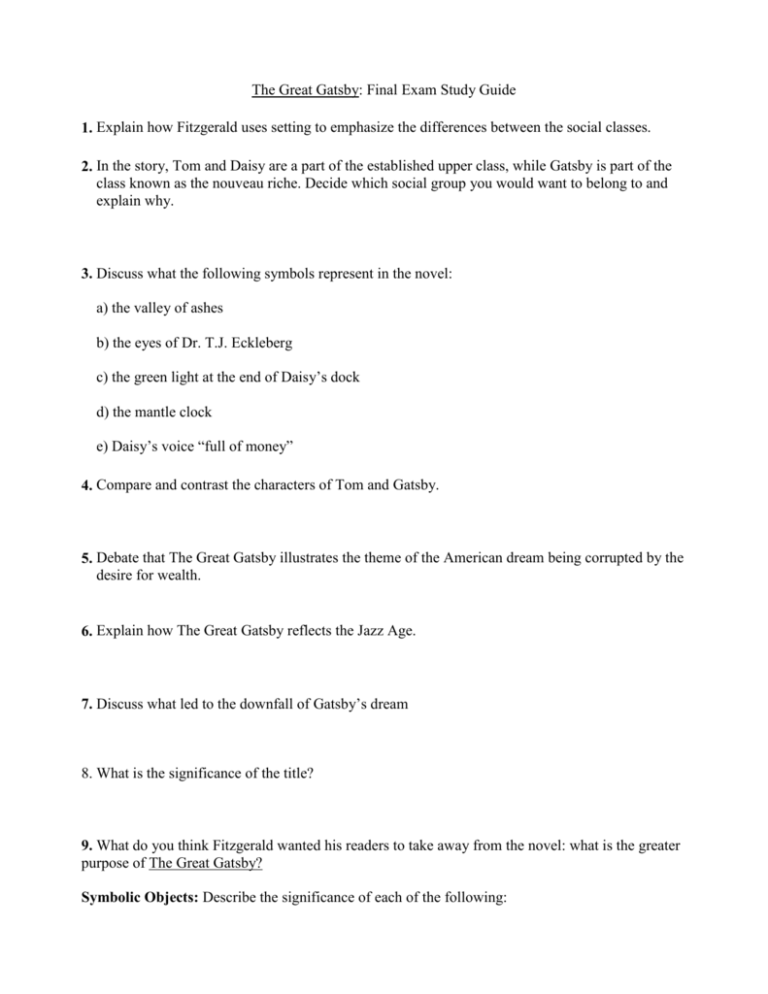
The Great Gatsby: Final Exam Study Guide 1. Explain how Fitzgerald uses setting to emphasize the differences between the social classes. 2. In the story, Tom and Daisy are a part of the established upper class, while Gatsby is part of the class known as the nouveau riche. Decide which social group you would want to belong to and explain why. 3. Discuss what the following symbols represent in the novel: a) the valley of ashes b) the eyes of Dr. T.J. Eckleberg c) the green light at the end of Daisy’s dock d) the mantle clock e) Daisy’s voice “full of money” 4. Compare and contrast the characters of Tom and Gatsby. 5. Debate that The Great Gatsby illustrates the theme of the American dream being corrupted by the desire for wealth. 6. Explain how The Great Gatsby reflects the Jazz Age. 7. Discuss what led to the downfall of Gatsby’s dream 8. What is the significance of the title? 9. What do you think Fitzgerald wanted his readers to take away from the novel: what is the greater purpose of The Great Gatsby? Symbolic Objects: Describe the significance of each of the following: 1. The Green Light 2. The Valley of Ashes 3. Dr. T.J. Eckleberg’s Eyes 4. East Egg vs. West Egg Major Themes: 1. The Decline of the American Dream 2. The Emptiness of the Upper Class 3. The distinction between classes 4. Significance of locations (setting) a. The Eggs b. The Valley of Ashes c. New York City Major Quotes: choose five quotes from the novel that you feel best represents the purpose of the novel, best represents a major theme or idea, or represents a major character in the novel. Identify when the quote was stated, the significance of the quote, and who is speaking. Major Characters: Identify all major characters, describe their appearance, describe Nick’s impression of the character, identify any changes that occur to the character throughout the novel, and choose one important quote that best describes the character. Pre-Reading 1. Why are we still reading a book written in the 1920's? What gives a book its longevity? 2. How was the 1920's a reaction to WWI? 3. Some people think that having money leads to happiness. Do you agree? Why or why not? What are the advantages or disadvantages of being wealthy. 4. What is the "American Dream"? Where did it originate, and how has it changed over the centuries? 5. Have you ever wanted to relive a moment from your past, to redo it? Describe the situation. How and why would you change the past? Chapter 1 1. Notice how many times Fitzgerald uses the words hope, or dream. Why does he do this? 2. Nick starts the novel by relaying his father's advice "Whenever you feel like criticizing anyone, just remember that all the people in this world haven't had the advantages that you've had." List Nick's advantages. Does he reserve judgment in the novel? 3. Pay attention to time. What is the day and year during the first scene at Daisy's house? 4. Describe Nick. What facts do you know about him, and what do you infer about him? What kind of a narrator do you think he will be? 5. What image does the author use to describe Jordan Baker? What does it mean? 6. How does Nick react to Jordan? 7. What does Tom's behavior reveal about his character? Chapter 2 1. Describe the "valley of ashes." What does it look like and what does it represent? 2. Describe Mr. Wilson and Myrtle. Do they seem to fit into the setting? 3. What more have you learned about Nick in this chapter? Is he similar or different than the people he spends his time with? 4. Describe the violent act Tom committed against Myrtle. What does this reveal about him? Chapter 3 1. Pay attention to Nick's judgments. What do they reveal about his character that he does this (especially in relation to his opening comments)? 2. Describe Gatsby the first time Nick sees him. 3. What rumors have been told about Gatsby? Why does Fitzgerald reveal rumors rather than fact? 4. What does Nick think of Gatsby after meeting him? 5. How is Gatsby different from his guests? 6. Why does Nick choose to share his thoughts and feelings with Jordan? 7. Nick thinks he's one of the few honest people he knows, why? Do you think he is honest? Chapter 4 1. 2. 3. 4. 5. 6. 7. List all of the rumors told about Gatsby. Why does Fitzgerald list all of Gatsby's party guests? Why does Gatsby tell Nick about his life? Do you believe Gatsby? Does Nick? What role does Meyer Wolfsheim play in the novel? What does Jordan's story of Daisy's marriage reveal about Daisy? Why did Gatsby want Daisy to see his house? Nick says, "There are only the pursued, the pursuing, the busy and the tired." What does Nick mean? How does each character in the novel fit into this schema? Chapter 5 1. 2. 3. 4. 5. Why does Gatsby deliver so many goods and services to Nick's house? Describe the effect of rain on the plot. Why does Gatsby offer Nick work? How does Nick feel about this? Explain the significance of the green light. Why does Gatsby get so many phone calls? What does this say about him? Chapter 6 1. How truthful was Gatsby when he relayed the story of his life to Nick? Why does Fitzgerald tell the story of Jay Gatz now? 2. Describe the meeting of Tom and Gatsby. What does this meeting reveal about them? 3. Why did Daisy and Tom find Gatsby's party loathsome? 4. How did Gatsby measure the success of his party? 5. When Nick told Gatsby that "you can't repeat the past", Gatsby replied, "Why of course you can!" Do you agree with Nick or Gatsby? Chapter 7 1. Describe Daisy and Gatsby's new relationship. 2. Compare George Wilson and Tom. What did each man learn about his wife and how did they each react? 3. If Daisy says she's never loved Tom, is there someone whom she thinks she loves? 4. Describe the fight between Gatsby and Tom. What do these men think of each other? How are they similar and how are they different? 5. What was significant about Nick's 30th birthday? 6. What do you think Tom and Daisy were saying to each other in the kitchen? Do you think that Tom knew Daisy was driving the "death car"? Why, why not? Chapter 8 1. How does Fitzgerald achieve a melancholic mood in the beginning of this chapter? 2. How are seasons used in constructing this novel? 3. Who is Dan Cody and what is his significance in Gatsby's life? 4. How does Nick's statement "You're worth the whole bunch put together" show a change in Nick from the beginning of the novel? 5. How does T. J. Eckleberg affect Mr. Wilson? Chapter 9 1. 2. 3. 4. 5. Why did Nick take care of Gatsby's funeral? How was Jay Gatz's childhood schedule consistent with the adult Gatsby's behavior? Who attended Gatsby's funeral? How and why is this significant? What is the purpose of Nick's last meeting with Jordan? Why does Nick call Tom and Daisy "careless people"? Post Reading 1. Does this novel have villains and heroes? Why, why not? If yes, who fits into these categories and why? 2. Nick is both part of the action and acting as an objective commentator. Does this narration style work? Why, why not? 3. How did Fitzgerald use weather to reflect the mood of the story? Again, why are we still reading a book written in the 1920's? What gives a book its longevity? And which of its themes are eternal in the American psyche.



